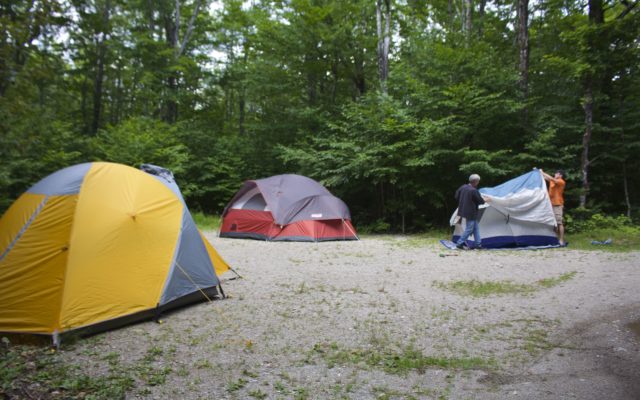
6 ways to improve your camping experience in Maine
Sometimes it only takes one thing to make your camping experience infinitely better, whether that’s insect repellent, a pillow or that card game you’ve been meaning to try. Taking the time to plan ahead and carefully pack can really pay off when you’re out in the wilderness piecing together tent poles.
So before you hit the road for a few nights under the stars, here are a few ways you may be able to improve your camping experience.
Put some thought into your sleeping arrangements.
It’s challenging to be at your best if you aren’t getting a good night’s sleep. Therefore, putting a little effort into building a comfortable bed and shelter can have a huge impact on your camping trip.
In Maine, a comfortable bed will likely include plenty of warm blankets (more than you anticipate you’ll need), a pillow and a thick cushion between you and the forest floor, which is usually quite uneven with rocks and tree roots. Some campers sleep on blow-up mattresses while others prefer foam pads or collapsible cots.
The type of shelter you use and bed you create may be dictated by your mode of transportation and the remoteness of your site. If you can park a vehicle near your campsite, you’re limited by what your vehicle can carry. But if you have to hike into your campsite, you’re limited by what you can carry on your back.
For tips about how to make a tent as comfortable as possible, check out A beginner’s guide to camping in a tent in Maine.
Get creative with campfire food.
Food is a highlight of camping. Over the campfire, hot dogs and s’mores are old standbys. But there are plenty of other easy and delicious campfire snacks that you may want to try during your trip, including traditional campfire-baked apples, caramelized citrus, soft pretzels on a stick and chocolate-stuffed banana boats.
Tin foil can be used as a cooking surface or to create packets to contain food while it’s cooking on the campfire coals. And with a simple cast iron pan or Dutch oven, you can cook a wide variety of meals over open flame. Portable stoves and grills can also broaden your camp culinary horizons.
Protect yourself from flies and ticks
Mosquitoes, blackflies, deer flies and no-see-ums can all ruin a camping experience if you’re not prepared. Fortunately, there are many ways to defend yourself against these biting flies. First and foremost, cover up as much skin as possible. Wear pants, long socks and a long-sleeved shirt, sweatshirt or fleece. Throw on a hat to keep flies out of your hair. And consider using insect repellent, whether you spray it on your clothing or directly onto your skin.
Around a campfire, the heat and smoke will drive some flies away. You can also use bug-repellent candles or, if you don’t mind an elaborate camping set up, you can invest in a screened-in, portable gazebo to use as a hangout spot away from the fire.
Similarly protect yourself from ticks by covering your body with clothing and wearing repellent. Consider treating your clothing with permethrin, which has proven to be highly effective in repelling ticks. Conduct tick checks (in which you search for ticks on your body) multiple times a day, and remove any ticks you find on your body as soon as possible.
Don’t leave food or fragrant items unattended.
If left unattended at a campsite, your food will likely be stolen by a wild animal. This may seem funny at first, especially if it’s a cute little chipmunk pilfering trail mix, but it can become a major problem if wild animals in the area start to associate people with food.
For example, Baxter State Park started seeing more black bear activity at campsites last year after a camper left Doritos and English muffins out unattended.
When you’re done eating, secure your food inside your vehicle (if it’s nearby) or string it up in a tree using a bear bag. You can also use containers that are specifically designed to keep out bears and other animals.
Pack games.
Board games, cards and lawn games are great ways to stay occupied and have fun while camping. If your campsite doesn’t feature a picnic table, you may want to pack a few chairs and a table so you can comfortably play board games or cards. And if your campsite features an open area, games like cornhole, bocce ball and ladder toss are great options, especially for a group. You can start up a tournament. Plan ahead and pack a fun prize for the winner.
Reduce your impact.
A great way to wrap up your camping experience is to clean up the campsite. Enlist every camper to walk the entire site, picking up every scrap of trash. This idea is to leave the area better than you found it.
To learn more about reducing your impact on wilderness areas, check out Leave No Trace, a set of outdoor ethics and principles that are followed by outdoor recreators throughout the country.
The seven principles of Leave No Trace are: plan ahead and prepare; travel and camp on durable surfaces; dispose of waste properly; leave what you find; minimize campfire impacts; respect wildlife; and be considerate of other visitors. These are all important things to remember when camping and will likely help you have a more enjoyable and fulfilling experience.
Aislinn Sarnacki can be reached at asarnacki@bangordailynews.com. Follow her on Twitter: @1minhikegirl, and Instagram: @actoutdoors.